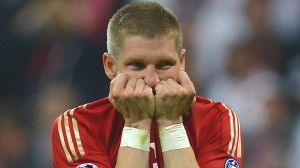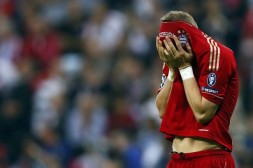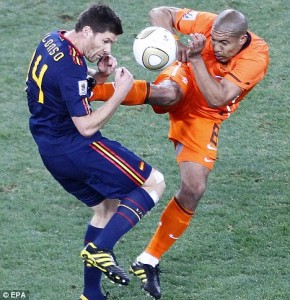Wondering why this didn't get published until nearly three years after the events it describes? Please see here.
I said it was the Bargaining stage, but my wife said it was pure Denial: if Andre Marriner awarded the obvious penalty to Gareth Bale in the 20th minute instead of making an ass of himself (Marriner) for booking him (Bale) for diving, then maybe just maybe Newcastle decide that having the opportunity to play the spoiler against Arsenal gets them fired up enough to at least hold the draw. I mean, Koscielny's goal was pretty ragged, to say the least. A team with something to play for doesn't give that up, do they?
Unfortunately, that's the kind of not-very-rational counterfactual you have to console yourself with when your team has slumped enough through the final two months of the season to find themselves no longer in control of their own destiny. It's painful, but is it surprising? I can't be the only Spurs fan who was hoping against hope that they'd avoid another late-season collapse, while at the same time watching each match with an air of dread, kind of expecting it. Because what had changed to prevent it?
Everything looked so good after Spurs beat Arsenal 2-1 on March 3rd, and then followed it with a total shellacking of Inter Milan, 3-0, on Thursday, March 7th. With ten games to play in the Prem, Spurs sat 3rd, two points ahead of Chelsea and seven ahead of Arsenal. They would be heading back to the San Siro without having given up an away goal. Things were looking good.
Three days later against Liverpool at Anfield, Spurs held a 1-2 lead going into the final quarter of the match. Liverpool looked on the ropes--and then in the 66th minute Kyle Walker got too casual and badly misplayed a backpass(?) to Hugo Lloris, which allowed Stuart Downing to easily steal the ball and beat Vertonghen on the line. (Breathe deep to quell your revulsion, then watch it here.)
Am I the only one who felt it, right then, that feeling of a switch being flipped? One minute, Liverpool are looking like a team beaten, Spurs are 24 minutes from an unbeaten run of 13 matches, including five wins in a row, and then the momentum shifts. As the match progressed, Spurs looked like they might be lucky enough to escape with a draw, but then in the 81st minute Jermaine Defoe made a dreadful backpass, Assou-Ekoto fouled Suarez in the box, and Spurs somehow managed to lose.
From there, the wheels came completely off: four days later at the San Siro, Spurs got totally outplayed and only advanced in extra time off a last minute Adebayor goal to win on away goals. Three days after that, they lost at home 0-1 to 11th-place Fulham. In their next tie in the Europa League, against Basel, they went out on penalties. Their draw against Everton on April 7th dropped them from third in the league to fifth, as both Arsenal and Chelsea passed them.
Going into the last weekend of the season, they'd gone unbeaten in seven, with four wins and three draws, but still trailed Arsenal by one point for the final Champions League spot.
So here they were on the last day needing help from Arsenal/Arsenal's opponent Newcastle to get into the Champions League, save their season, and not lose their best player. Their best hope was to get an early goal to put pressure on Arsenal and perhaps enliven Newcastle. They should have had that chance in the 20th minute, but Marriner shafted them, and after that the team looked subdued for most of the rest of the match. Arsenal scored, and little hope remained. A limping 0-0 draw looked like a real possibility. Then in the 89th minute Gareth Bale uncorked one last amazing goal (doubtless raising his transfer fee by another £5 million in the process) and Spurs finished
the season with a vapid half-triumph. One more collapse, one more fifth-place finish, one more impending loss of their best player.
(Video of Koscielny's goal for Arsenal and Gareth Bale's for Spurs here.)
Repeat a tragedy enough times and it becomes a farce.
But how I was hoping. Spurs played most of the season with a squad containing one-and-a-half strikers (and even that may be giving Adebayor too much credit), a didn't-make-much-sense amalgam of players brought in to fill the hole left by Luka Modric's departure for Real Madrid, and one player whose rise has been so meteoric, I've been continually terrified that one day I'd hear he'd failed a PED test.
If you're an Arsenal fan, Spurs' yearly farce is delicious (read this ESPNFC post to get a feel for the level of gloating we're talking about), but for the rest of us, isn't Spurs-to-the-Champions-League the better story? Getting third or fourth place with a limited, unbalanced squad, keeping the most exciting player in the Prem, finding out what AVB can achieve when he actually stays with a squad for more than one season (which he's never done) and with the greater transfer flexibility afforded by Champions League money and the appeal to outside players looking to join a squad in the ascendancy? If you root for any team besides Arsenal, tell me the truth: would you rather see one-dimensional Theo Walcott against Europe's best, or Gareth Bale? It can't just be Spurs fans who are tired of watching Arsene Wenger scowl on the touchline as his overmatched team--always punching above their weight, but still--crashes out of the Champion's League and finishes the Prem in 4th place.
Yes, I'm a diehard fan, and yes, I'm biased, but Spurs in the Champions League would have been the better story. We've already seen the movie (just last year!) where Spurs finish fifth and lose their best player. But here it is: Hello Europa League for Spurs, Hello Real Madrid for Spurs' Best Player: The Sequel. So sure, I'm making my way through the five stages of grief. But how many stages of boredom are there?


